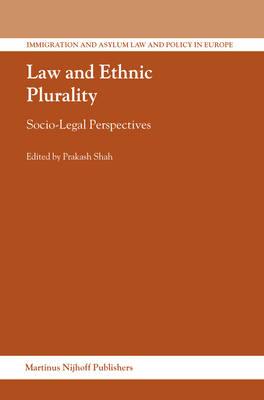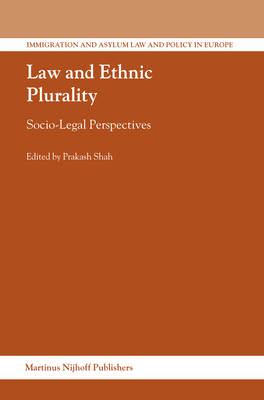
- Afhalen na 1 uur in een winkel met voorraad
- Gratis thuislevering in België vanaf € 30
- Ruim aanbod met 7 miljoen producten
- Afhalen na 1 uur in een winkel met voorraad
- Gratis thuislevering in België vanaf € 30
- Ruim aanbod met 7 miljoen producten
Zoeken
Law and Ethnic Plurality
Socio-Legal Perspectives
€ 225,95
+ 451 punten
Omschrijving
The large-scale establishment of ethnic minorities and diasporic communities in Europe has gained the attention of social science scholars for a number of decades now. However, legal interest in this field has remained relatively underdeveloped, and few scholars have addressed emerging legal issues to any significant degree. This collection of contributions by leading writers in the field of ethnic migration and diaspora studies therefore provides some important interdisciplinary perspectives of how ethnic/diasporic minorities in British and European contexts interact with the official legal system. This volume makes a significant contribution in assessing the role of law in current debates on the integration of ethnic and religious minorities of migrant origin in the EU. The chapters derive from papers first delivered at a lecture series on 'Cultural Diversity and Law' at the Institute of Advanced Legal Studies. The contributors' disciplinary interests range across law, anthropology, sociology, geography and political theory, and each one addresses the issues within his or her field of study by adopting approaches that place law within its wider social and political context. The topics covered range from a number of 'public' and 'private' law issues as well as the more conceptual realms of jurisprudence. They include marriage laws, approaches to dispute resolution, the role of courts and juries in the criminal justice system, drugs policies and the criminalisation of minorities, free speech and blasphemy, planning laws and the construction of religious buildings, composition of the judiciary, the normative foundations of cultural diversity in law, and integration and law. The compilation should therefore attract an interest beyond its core readership in law, making legal issues accessible to a whole range of students and policy makers within the social sciences.
Specificaties
Betrokkenen
- Uitgeverij:
Inhoud
- Aantal bladzijden:
- 239
- Taal:
- Engels
- Reeks:
- Reeksnummer:
- nr. 13
Eigenschappen
- Productcode (EAN):
- 9789004162457
- Verschijningsdatum:
- 15/10/2007
- Uitvoering:
- Hardcover
- Formaat:
- Genaaid
- Afmetingen:
- 163 mm x 245 mm
- Gewicht:
- 589 g

Alleen bij Standaard Boekhandel
+ 451 punten op je klantenkaart van Standaard Boekhandel
Beoordelingen
We publiceren alleen reviews die voldoen aan de voorwaarden voor reviews. Bekijk onze voorwaarden voor reviews.







